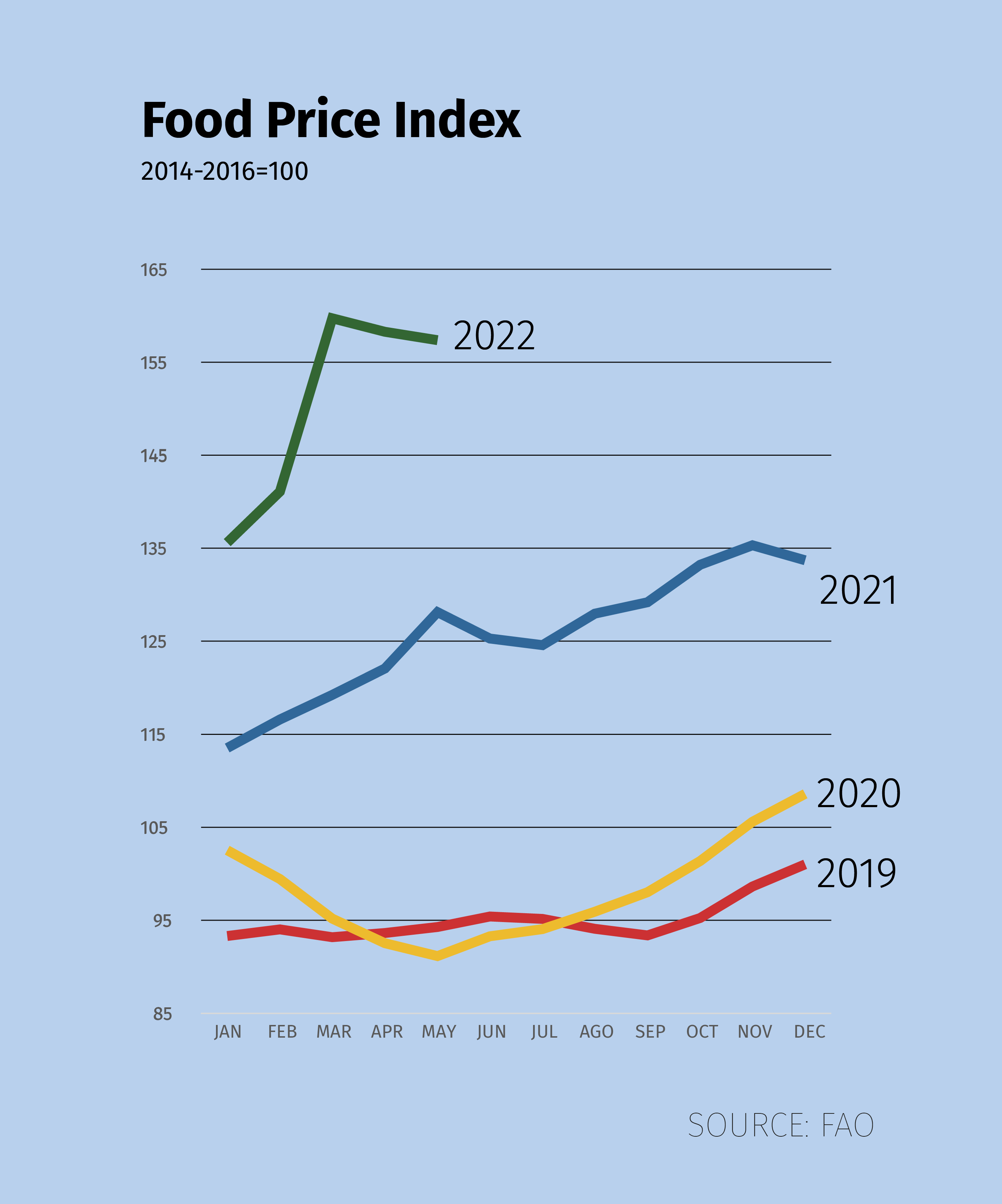 Supermercado en Ecuador. Foto: Paul Salazar/Banco Mundial
Supermercado en Ecuador. Foto: Paul Salazar/Banco Mundial
Putting food on the table has become harder for families across Latin America and the Caribbean (LAC).
The global crisis has hit the region hard: rising prices of fuel and food have undermined the purchasing power of all families , but especially the poorer that spend a large share of their income on meals and transportation. They have been skipping meals because they can’t afford them or lack the resources to get them. This is particularly troublesome in Andean, Caribbean, and Central American countries, where over 30% of households are facing this plight, according to a survey by the World Bank.
A situation like this calls for an urgent response, both in the short and long terms, as we explain in this blog.
First, let’s take a quick look at the origins of the global food price crisis, which has deep roots. Even before the Russia-Ukraine war threatened global food security by disrupting trade in food, fuel, and fertilizer, food prices were on the rise globally, as Figure 1 shows.
In recent years, extreme weather events have combined with COVID-19-related impacts on food and labor supply chains to undermine food production and exert further upward pressure on food prices . As a result, we have seen food price inflation above overall inflation in nominal and real terms in several Latin American and Caribbean countries, as Figure 2 shows.
Note: Food Inflation for each country is based on the latest month from January to March 2022 for which both the
Food component of Consumer Price Index (CPI) and the overall CPI data are available. Real food inflation is
defined as food inflation minus overall inflation.
The effects of the global food price crisis are significant and go well beyond their regional impacts. Since LAC is the world’s largest net food exporting region whatever happens in its agri-food systems has implications around the globe .
Indeed, Latin America and the Caribbean can benefit from international food prices increases. But some gains -for example, from global prices of cereals- are being partly offset by hikes in the cost of production due to increased prices of fertilizers and petroleum.
Farmers and ranchers play an important role in lowering and stabilizing food prices by supplying the market with food in a timely manner. However, in order for them to be able to provide this food supply response, the agriculture and food policy environment should promote investment to improve competitiveness in the sector to respond to market opportunities. Therefore, LAC should avoid policies that discourage competitiveness and investments, such as ad-hoc trade measures or mandates.
Ensuring local and global food supplies for the long haul
What can be done? We met recently with Ministers of Agriculture from the region who were very concerned about surging food prices and sharply increased fuel and fertilizer costs. They shared their views and ongoing plans on how to support the sector to continue to supply food locally and globally. The responses to the food crisis vary depending on country’s specific circumstances. Yet, it will be critical to devise an appropriate combination of urgent measures to shield the most vulnerable from food price increases , and more strategic actions designed to ensure that the food supply will be strengthened and maintained in the years to come.
Actions to address the food crisis will be needed in four areas:
1. Protect the most vulnerable. With food prices surging, many families are facing grave affordability and availability issues. These challenges are particularly acute in countries in the Caribbean, Central America, and Andean subregions, where over 30% of households have skipped a meal in the last 30 days. Governments have an important role in ensuring that all people have access to adequate amounts of healthy and nutritious food. Here circumstances matter. In countries where food is available, and the main barrier to access is high cost, well-targeted cash transfer programs may be an effective way to help vulnerable households. In other countries where food costs are not high, but fertilizer and oil prices have been increasing, it is important to ensure continued agriculture investments to keep food production and productivity while maintaining stable supplies and stocks in the short and medium-term into the next harvest.
2. Keep food flowing into markets. When a global food price crisis occurs, such as the current one, policymakers come under pressure to limit further domestic food price rises or to increase the availability of food supplies (for example, by changing agriculture trade measures on food imports or exports). These measures almost never work and usually do more harm than good by disrupting the price signals needed to make food markets work efficiently. Policymakers should ensure that regional and international agricultural and food markets remain open so that trade keeps flowing and farmers receive the right incentives to produce more for the next harvest.
3. Keep farmers producing today. Since the demand for food is relatively fixed, increasing supply is the best way to ease pressure on high food prices . Most of the food consumed in LAC is produced within the region, so a key to resolving the crisis is to bolster the next harvest. High food prices provide incentives to increase production, but the income gains from higher output prices are largely being offset by higher input prices, especially for fertilizer and fuel. Governments can play an essential role in keeping small farmers producing by:
- Ensuring that they have access to inputs such as seeds and fertilizers;
- Eliminating or reducing food and agriculture trade restrictions where these exist; and
- Facilitating access to finance to help farmers address higher production costs and take advantage of market opportunities.
4. Invest in green, resilient, and inclusive food systems for tomorrow. The global food price crisis has exposed significant vulnerabilities in the region’s food systems and highlighted the need to tackle them. Policymakers face the challenge of mobilizing the political support and investments needed to build, over the medium to longer-term, agri-food systems that are productive, resilient, sustainable, and inclusive. While the current crisis is exacting painful costs, by refocusing attention on the need to avoid future crises, we can build consensus on reforms to help green our agri-food systems.
Short-term actions, long-term consequences
The food price crisis has created an urgent need to respond to immediate needs. Still, we must not take our eyes off the long-term goal of transforming the region’s food systems so that they can become more resilient and contribute to the economy, the environment, and human health, both regionally and worldwide.
During the past three years (2019-2021), the World Bank has provided significant support for food systems in LAC – about $300 million annually for agricultural development programs and another $1.5 billion annually for social protection programs.
We stand ready to help countries implement emergency measures to respond to immediate needs stemming from the global food price crisis and make investments to get on track with their longer-term food system resiliency.
Transformed food systems in Latin America and the Caribbean can become a cornerstone of green, resilient, and inclusive development, advancing the health of people, the region’s economies, and the entire planet.






Join the Conversation